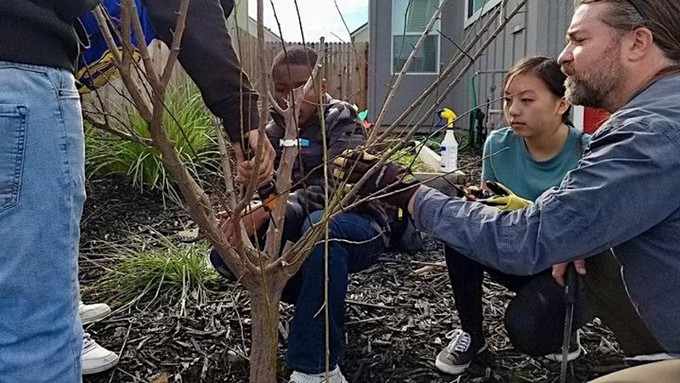
Alchemist CDC offers two free workshops in Sacramento

The skills and tools of fruit tree pruning are just part of two workshops offered this month by Alchemist Community Development Corporation. Photo courtesy Alchemist CDC
Learn a gardening skill – pruning fruit trees – while helping your community.
The Alchemist CDC is offering two free workshops, focusing on winter care for deciduous fruit trees. Participation is free for these hands-on events, but advance registration is necessary.
On Feb. 12, the workshop will be held at Oak Park Art Garden, 3834 Martin Luther King Jr. Blvd., Sacramento. (Register here: https://bit.ly/3K6WKjU.) On Feb. 19, the pruners in training will tackle Mirasol Village Community Garden, 701 Pipevine St., Sacramento (just south of Richards Boulevard). (Sign up here: https://bit.ly/3YYYwIr.)
Both pruning workshops will be held from 9 a.m. to 1 p.m. More details are available (search for "fruit tree pruning") via eventbrite.com.
“Learn the essential skills of winter fruit tree pruning at one of Sacramento’s community orchards,” say the organizers. “We’ll explore the craft of pruning, the tools that make it possible, and demonstrate the practice on fruit trees in the community orchard. We’ll also explore how urban agroforestry can play a significant role in enhancing the resilience of our urban ecosystems and communities to a changing climate.”
What is urban agroforestry? Growing (and managing) fruit trees in the city for residents to enjoy.
Dominic Allamano, an urban agroforester and experiential educator, will be the instructor for both workshops. According to his website bio, Allamano is working “at the intersection of urban food system repair, climate change adaptation and the long term re-connection of communities and the land they inhabit together.”
He worked for five years as the Edible City Coordinator at Soil Born Farms, developing an urban food forestry initiative that included the regional Harvest Sacramento fruit gleaning program, as well as garden building and fruit tree planting programs serving residents of South Sacramento, says his bio.
Focusing on food and nature, Alchemist Community Development Corporation is a fast-rising force for good in Sacramento-area neighborhoods – “connecting communities with land, food and opportunity.”
"Alchemist CDC is a mission-driven organization that connects Sacramento area communities to land, food, and opportunity toward a vision in which all neighborhoods are vibrant, equitable, healthy, and diverse,” according to the organization. “We are best known for enhancing the quality of life in under-resourced communities by improving access to nutritious foods, implementing community-supported public green spaces, and fostering economic self-sufficiency through business entrepreneurship.”
Details: https://alchemistcdc.org/.
Comments
0 comments have been posted.Sacramento Digs Gardening to your inbox.
Sites We Like
Garden Checklist for week of May 5
Survey your garden after the May 4 rainstorm. Heavy rain and gusty winds can break the neck of large flowers such as roses. Also:
* Keep an eye on new transplants or seedlings; they could take a pounding from the rain.
* Watch out for powdery mildew. Warmth following moist conditions can cause this fungal disease to “bloom,” too. If you see a leaf that looks like it’s dusted with powdered sugar, snip it off.
* After the storm, start setting out tomato transplants, but wait on the peppers and eggplants (they want warmer nights). Pinch off any flowers on new transplants to make them concentrate on establishing roots instead of setting premature fruit.
* Trim dead flowers but not leaves from spring-flowering bulbs such as daffodils and tulips. Those leaves gather energy to create next year's flowers. Also, give the bulbs a fertilizer boost after bloom.
* Pinch chrysanthemums back to 12 inches for fall flowers. Cut old stems to the ground.
* Mulch around plants to conserve moisture and control weeds.
* From seed, plant beans, beets, cantaloupes, carrots, corn, cucumbers, melons, pumpkins, radishes and squash.
* Plant onion sets.
* In the flower garden, plant seeds for asters, cosmos, celosia, marigolds, salvia, sunflowers and zinnias. Transplant petunias, zinnias, geraniums and other summer bloomers.
* Plant perennials and dahlia tubers for summer bloom.
* Don’t wait; plant summer bulbs, such as gladiolus and tuberous begonias.
* Harvest cabbage, lettuce, peas and green onions.